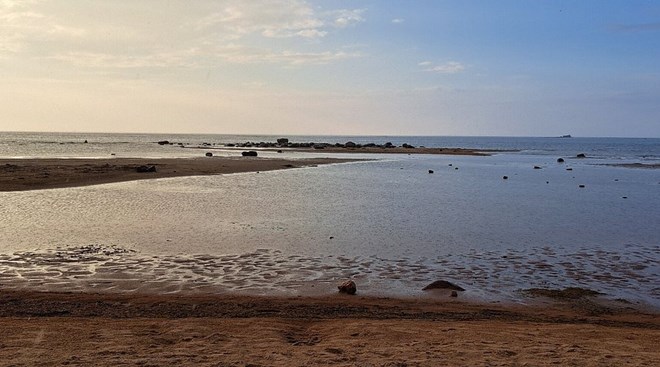
Tuesday July 29, 2025

The shallow shoreline of the Vaskiluoto beach in Vaasa, Finland, where three Somali teenagers drowned earlier this month. The tragedy has renewed calls for improved water safety measures and youth education programs in the region.
HELSINKI, Finland (HOL) — Three Somali-Finnish teenagers drowned last Friday while swimming at Kalajoki’s Hiekkasärkät beach, prompting widespread mourning and renewed calls for lifeguard supervision at one of Finland’s most visited summer destinations.
The boys, two aged 15 and one aged 16, had been playing with a ball in the water when they drifted approximately 100 meters from the shoreline and began calling for help. Witnesses attempted to intervene using paddleboards, but were unable to reach the teens in time.
Two of the boys were recovered on Friday evening. The third body was found late Saturday night by a volunteer diver using sonar equipment provided by Finland’s Voluntary Rescue Service. Authorities have not released the victims’ names but confirmed they were Finnish residents of Somali descent.
All three were Finnish residents of Somali descent. Their names have not been released, but the Northern Finland Islamic Congregation confirmed their backgrounds. Imam Abdul Mannan, who is assisting the families, described the loss as devastating.
“We are trying to carry out the funeral rites as soon as possible,” he said. “This is an unspeakable tragedy.”
Mannan also criticized the lack of lifeguards at the beach. “Why were these boys allowed to swim without oversight?” he asked. “This is a serious failure.”
Despite being one of Northern Ostrobothnia’s busiest coastal spots, Hiekkasärkät beach has had no lifeguard presence for over two decades. The incident has reignited public debate about summer safety standards and beach supervision across Finland.
Police say the boys were swimming outside a designated safety zone and may have encountered a sudden drop-off or soft seabed. Lead investigator Jan Sormunen said the exact cause remains uncertain but likely involved a combination of fatigue, panic, and unpredictable underwater conditions.
“We don’t suspect foul play,” Sormunen said. “But this is the worst possible outcome.”
The drownings occurred during a deadly day for Finnish waters. At least six water-related deaths were reported across the country on Friday alone, including incidents in Espoo and Lahti.
The Finnish Swimming Teaching and Lifesaving Federation has previously reported that drowning risks disproportionately affect individuals from immigrant backgrounds, often due to limited swimming skills and barriers to safety training. Children with disabilities or from refugee families are at heightened risk, especially when systemic or cultural obstacles prevent access to preventive services.
The drowning mirrors a string of tragedies involving members of the Somali diaspora in Western countries. In September 2024, a Somali mother and her four-year-old daughter drowned in the Loing River in Nemours, France, after the child fell in and the mother tried to rescue her. In June 2024, a four-year-old Somali-American boy with autism drowned in Minnehaha Creek near Minneapolis. Nonprofits at the time cited the lack of culturally responsive safety infrastructure and awareness campaigns in immigrant communities.
For many in the Somali community, the deaths have reignited memories of the 2019 case of Shukri Abdi, a 12-year-old Somali refugee who drowned in the River Irwell in Bury, UK. British authorities initially declared her death an accident, prompting protests from the Somali-British community, who cited prior bullying and inconsistencies in the investigation.
A formal inquest later ruled Shukri’s death a “terrible misadventure” but found that another child who had encouraged her into the water “did not act in a way that she knew would result in death.” The coroner, Joanne Kearsley, emphasized that Shukri could not swim and entered deep water only after pressure from a peer, which placed her in a vulnerable situation. The Independent Office for Police Conduct (IOPC) separately examined whether Greater Manchester Police’s handling of the case reflected racial bias. While it found no evidence of discrimination, the force was criticized for prematurely determining there were no suspicious circumstances and failing to treat the family with sufficient sensitivity. The case became a flashpoint for discussions around institutional racism and safeguarding failures involving refugee children.
At Hiekkasärkät, a makeshift memorial formed over the weekend as mourners laid flowers and lit candles. Residents, tourists, and Somali community members gathered over the weekend to pay their respects.
City officials in Kalajoki, together with the regional welfare authority Pohde and local clergy, have mobilized crisis response teams. Mental health counsellors and youth workers were stationed near the Surffari campsite where the boys had been staying.
As funeral preparations begin, Somali community leaders and advocates are calling for systemic changes, including the return of lifeguards to major public beaches, better outreach to immigrant families, and sustained education campaigns tailored for non-native residents.






